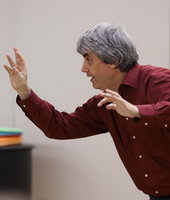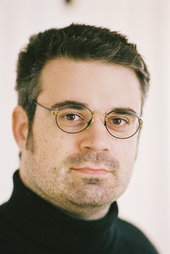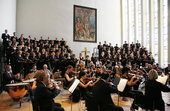01.10.2014 - New Release - Felix Mendelssohn Bartholdy's "ELIJAH" op.70
Following upon the highly acclaimed live recording of Frank Martin's Requiem and Arthur Honegger's cantata La Danse des morts (TRO-CD 01441), Troubadisc is pleased to present another sterling performance from the Choir of St. Nikolai in Hamburg, conducted by its longstanding director, Matthias Hoffmann-Borggrefe.
There are many reasons why Mendelssohn's Elijah belongs among the jewels of the nineteenth-century romantic oratorio repertoire. In formal terms, it combines elements of the sacred oratorio with dramatic elements from classical and romantic opera, drawing especially on Mozart and Carl Maria von Weber while reaching back to Bach, Handel, and Haydn. Its musical language is highly romantic, and its treatment of the vocal parts and orchestra reveals Mendelssohn at the height of his powers. Ever since its first performance, conducted by the composer himself at the Birmingham Festival on 16 August 1846, the work has been supremely popular among choruses and audiences alike.
The libretto poses uneasy questions. The God of the prophet Elijah is the wrathful God of the Old Testament who annihilates all unbelievers: "For God is angry, angry with the wicked ev'ry day; and if the wicked turn not, the Lord will whet his sword" (Aria No. 7). We can still hear much the same today. Moreover, the entire text is practically a debate on the problem of theodicy: if God is merciful, how can he allow so many terrible things to happen? On the other hand, Elijah is also a profession of faith: several of its central movements reflect the five sections of the Sunday Mass (Nos. 2, 9, 16, 35, and 41b), and its actual goal is the coming of Christ ("But the Lord from the north has raised one, who from the rising on his name shall call").
Matthias Hoffmann-Borggrefe has made a deep study of Mendelssohn's piece. In his remarkable booklet essay, he probes the extent to which Elijah is also a key to the composer's biography. In his opinion, "Mendelssohn, with his Elijah, wanted to issue a plea for greater tolerance among the religions, and especially for a complete emancipation of his fellow Jewish citizens in a free, liberal, and enlightened society. The reality looked much different – as he was made to experience first-hand." Viewed in this light, it is a tragic irony that the Christus oratorio which was meant to follow Elijah was left unfinished.
Hoffmann-Borggrefe presents a well-considered interpretation that deals intensively with musical details without losing sight of the work's overall rigor. He is assisted by such superb vocalists as Katherina Müller, Yvi Jänicke, Michael Connaire, and a truly stentorian Elijah in the form of the bass-baritone Yorck Felix Speer. The Choir of St. Nikolai is accompanied by judicious and inspired playing from the Hamburg Camerata. The multi-track recording uniquely captures the special atmosphere of this concert of November 2013.
Felix Mendelssohn Bartholdy (1809-1847)
"ELIJAH" Oratorio on words from the Old Testament, op. 70 (1846)
for solo voices, chorus, orchestra and organ
Revised version of 1847
Katherina Müller, soprano
Yvi Jänicke, contralto
Michael Connaire, tenor
Yorck Felix Speer, bass
Choir of St. Nikolai, Hamburg
Hamburg Camerata
Conductor: Matthias Hoffmann-Borggrefe
Live multi-channel Recording of the concert held on 15-16 November 2013
Church of St. Nikolai, Klosterstern, Hamburg
TRO-CD 01445

LAST Change: 7307__troubadev
(18.07.2014 - 14:25 Uhr)
CMS myty by tyclipso.net ©2005
troubadisc.de a belle artes project



